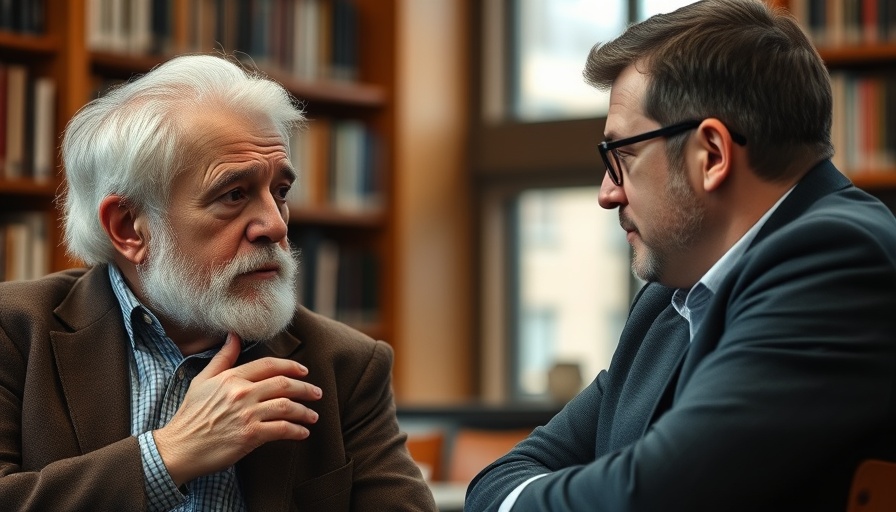
Understanding the Controversy: The Restoration of Pastors
The topic of restoring pastors involved in scandal or moral failure has been a contentious issue within the church community. In the ongoing debate, the significance of this practice is scrutinized. One prominent figure in this debate is Rick Joiner, who has gained notoriety for his views on reinstating fallen leaders back into ministry positions.
In Does God Command Restoring Predator Pastors? 10 Qs with Mike Winger (Ep 56), the discussion dives into the complex and often controversial issue of restoring pastors with troubled pasts, prompting us to analyze its implications more deeply.
Joiner’s theology suggests that restoring these pastors is a divine command, prompting many to question the implications of such actions. How does scripture inform this belief? And more importantly, is the notion of reinstating predatory behavior biblically sound or does it reflect a dangerous trend in church leadership?
The Biblical Framework on Restoration
At the core of this discussion lies the interpretation of biblical texts like Galatians 6:1, which states, "Brothers, if anyone is caught in any transgression, you who are spiritual should restore him in a spirit of gentleness." Joiner and his proponents argue that this verse provides a mandate to lift up even the openly flawed pastors back into positions of authority, yet many scholars suggest that this interpretation dilutes the original intent of the text, which focuses on spiritual restoration rather than ministry rehabilitation.
The passage calls for spiritual reconciliation, inviting individuals back into the community of faith, but falls short of endorsing the reinstallation of offenders into positions where they wield power over congregants. The complexity of restoration processes requires discernment, accountability, and evidence of genuine repentance—criteria that should not be overlooked.
Assessing Rick Joiner’s Approach
Joiner's unapologetic stance has enabled ministries like Morning Star to continue their practices, restoring pastors with histories of misconduct. His logic rests on the idea that withholding restoration could perpetuate darkness within the church—an assertion that has considerable merit but is flawed in its assumption that leadership positions should be informed by such teachings without rigorous accountability.
When discussing figures like Jim Baker, a minister whose past includes serious accusations of misconduct and fraud, the stark contrast between moral integrity and spiritual leadership becomes critical to examine. Baker's continued influence raises questions about the church’s accountability structures, revealing a culture that may protect the institution at the expense of its integrity.
The Dangers of Cover-Up Culture
Joiner operates within a broader milieu of cover-up culture that prioritizes salvaging reputations and maintaining charismatic leadership over ensuring the spiritual health of the congregation. This has created a disjointed understanding of what it means to serve faithfully in leadership. When pastors engage in predatory behavior, the implications are severe, impacting not just the victims but the entire church community.
By perpetuating a cycle where those guilty of misconduct can return as leaders, a dangerous precedent is set. In the light of scripture, the church is called to pursue justice, holiness, and truth rather than rush toward reinstatement.
A Call for Accountability and Discernment
A healthy church should have mechanisms to prevent, confront, and address the sins of leaders with the utmost seriousness. Yet, many congregations are burdened with leaders who have never truly undergone the necessary processes of repentance and accountability before being placed back into influential roles. As a result, the church can unintentionally become a breeding ground for abuses.
Effective accountability can be cultivated through structured oversight, restoration processes anchored in scriptural integrity, and a commitment to protecting congregational members from harm. This balance between grace and truth is critical, allowing the church to function as a safe and nurturing body of Christ.
Future Predictions for the Church
As discussions around these issues evolve, it’s likely that more churches will face scrutiny regarding their policies toward leadership restoration. There’s a growing demand among congregants for transparency and accountability, prompting many churches to reevaluate how they approach the restoration of leaders who fall from grace.
It’s essential for church leaders to understand that moral failures among pastors should not be dismissed lightly. The culture of grace must be distinct from enabling sin; recognizing this distinction is an ongoing challenge for many leaders.
Practical Steps for Churches
Churches can implement practical measures to ensure they are in line with biblical standards for leadership. This includes:
- Establish clearer guidelines for restoration that require evidence of true repentance, accountability, and transformation.
- Promote a culture in which congregants feel empowered to voice concerns without fear of retribution.
- Educate church members about the qualifications of church leaders as outlined in the New Testament, helping to cultivate discernment.
- Encourage pastoral accountability through supportive relationships with fellow ministers, enabling leaders to remain honest and open about their struggles.
- Consider involving lay leaders in ministerial decisions regarding restorations to help maintain perspective.
The Importance of Sound Theology
It’s evident that sound theology is paramount in church governance. Engage with scripture deeply to ensure that decisions are guided by biblical tenets rather than personal interests or popular opinion. Discussions around restoration must continually return to the core teachings of Jesus, balancing grace with an uncompromising commitment to truth.
Conclusion: A Call to Reflect
As churches grapple with the complexities of restored leadership, the faithful are called to reflect on what it means to wield spiritual authority. The desire for genuine restoration is noble, yet should not come at the expense of the vulnerable. The Bible lays a compelling roadmap for confrontation, healing, and renewal. The path forward must prioritize justice, accountability, and above all, the sanctity of the church's witness in society.
In light of the complexities surrounding ministry restoration, I encourage you—whether a leader or a congregant—to engage earnestly with scripture and foster open conversations within your church. It is only through a shared commitment to accountability that we can cultivate a flourishing and safe church environment.
 Add Row
Add Row  Add
Add 








Write A Comment